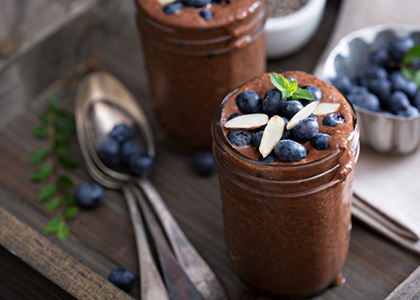
Top 10 Anti-inflammatory Foods to Eat When You’re Stressed
By Claire Georgiou, Reboot Naturopath, B.HSc ND
We know that chronic stress stimulates and increases inflammation in the body while inflammation aggravates and creates a physical stress on the body. Unfortunately these 2 perpetuate each other and create havoc. Chronic inflammation has been linked with a range of health conditions such as heart disease, depression and even cancer. When under stress, the immune system is unable to respond to hormonal control, and therefore produces a high level of inflammation that promotes many diseases.
Someone with a healthy and well-balanced plant-based diet is likely to be far less stressed both mentally and physically than someone with a poor diet. Studies have demonstrated that a highly nutritious diet high in fruits and vegetables supports a good mood with improved energy due to its many anti-inflammatory compounds. Many studies are indicating that pro-inflammatory foods can actually stimulate and cause an increased risk for anxiety and depression. Irregular blood sugar levels have been shown to stimulate and promote inflammation in the brain increasing the risk of depression, poor memory and low mood.
Eating emotionally when stressed is something many people engage in, but some do it more often than others. Emotional eating often includes highly processed foods, unhealthy fats, and sugar. We know that these foods may cause a very short-term relaxation response but work to further promote inflammation and create a stress response in the body that will aggravate fatigue, depression and lethargy.
Foods to avoid when stressed (or always) – these foods increase stress hormones and inflammation!
- Processed refined foods
- Sugar
- Soda and other sweetened foods and drinks
- Trans-fats
- Coffee and energy drinks
Foods that help to support mood and well-being also provide a myriad of health benefits that are anti-inflammatory and promote good health.
Dark Chocolate
One study in the Journal of Psychopharmacology revealed that people who drank an antioxidant-rich chocolate drink equal to about 1.5oz of dark chocolate daily felt calmer compared to those that did not. This effect was attributed to the antioxidant rich polyphenols that also exhibit a strong anti-inflammatory effect. Having the best of the best can help to increase endorphins and promote a happier mood. Skip the sugar and added extras in the regular chocolate and make your own or enjoy adding cacao in your smoothies, juices or snacks.
Dark Green Vegetables
These favorite veggies contain high levels of magnesium and B vitamins which are vital to help modulate stress, support relaxation and are anti-inflammatory. These vegetables are excellent for stress and inflammation and can be easily included in salads, smoothies, juices and more.
Oily Fish
Wild salmon, sardines and mackerel along with other foods such as walnuts, chia seeds and flax seeds are high in essential omega-3 fatty acids although the conversion to EPA from plant sources may be low in some people.
These not only reduce systemic inflammation but they also help to fight depression and other mood disorders that may be associated with stress. A study in Brain Behavior and Immunity showed a dramatic 20% reduction in anxiety among medical students taking omega-3.
Berries
Berries are high in many anti-inflammatory compounds including anthocyanins and other phenolic compounds such as quercetin, kaempferol, myricetin and chlorogenic acid that mop up inflammation and reduce oxidative stress. Blueberries are also helpful for reducing the risk of many chronic diseases including cognition and memory.
Turmeric
This one gets a lot of press about its anti-inflammatory properties, but did you know it’s beneficial and helpful for stress and depression? A study in 2014 published in Phytotherapy research found that turmeric may be as effective as fluoxetine (an antidepressant) in the treatment of major depressive disorder (MDD) and other depressive disorders.
Oats
Beta-glucan found in oats has been found to help reduce inflammation and chronic stress responses in the body. They found women taking beta-glucan had better moods, higher energy and fewer infections.
Avocado
Avocados are rich in vitamin E and healthy fats. Vitamin E is a potent antioxidant which is also has strong anti-inflammatory properties and helps to support mood and well-being.
Pumpkin seeds
Pumpkin seeds are a great source of tryptophan as are turkey, eggs, pineapple, kiwi fruit, plums, plantain and nuts. Tryptophan is an amino acid that your body converts into serotonin which supports a happy mood and helps to reduce and combat stress. These foods also contain many anti-inflammatory compounds to support healthy brain and mood function.
Bananas
These are also high in tryptophan, magnesium, potassium and vitamin B6 which are all supportive of a good mood, restful sleep and stress adaptation.
Fermented Foods
Studies are now connecting poor gut flora with poor mood. So consuming more fermented foods helps to modulate a happy mood along with supporting other health problems that have been linked to poor bacteria in the intestines such as allergies, eczema, IBS, constipation, lactose intolerance, asthma and a range of other chronic health ailments.
Herbal Medicines
Herbal medicines that can be helpful during a stressful period include St Johns Wort, Passionflower, Rhodiola, Withania, Damiana and/or Lavendula. Always check with your healthcare practitioner if you are taking any medication that may be contrindicated.
Here’s more on the effects of inflammation on the body!